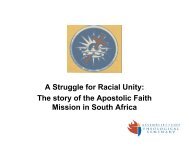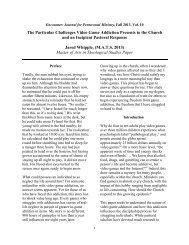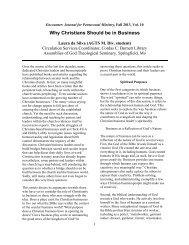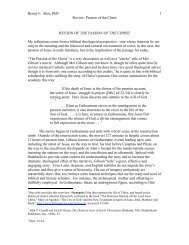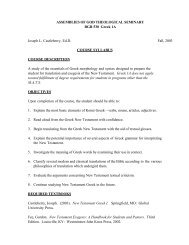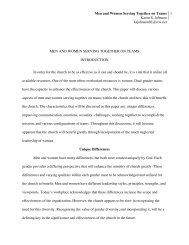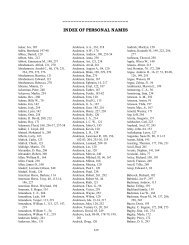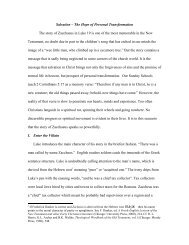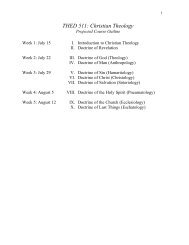Encounter: Journal for Pentecostal Ministry - Assemblies of God ...
Encounter: Journal for Pentecostal Ministry - Assemblies of God ...
Encounter: Journal for Pentecostal Ministry - Assemblies of God ...
You also want an ePaper? Increase the reach of your titles
YUMPU automatically turns print PDFs into web optimized ePapers that Google loves.
<strong>Encounter</strong>: <strong>Journal</strong> <strong>for</strong> <strong>Pentecostal</strong> <strong>Ministry</strong>: Summer 2009, Vol. 6<br />
A <strong>Pentecostal</strong> Perspective in a Politically<br />
Pugnacious Environment<br />
The purpose <strong>of</strong> this article 1 is tw<strong>of</strong>old: (1) to<br />
assess the current involvement <strong>of</strong><br />
<strong>Pentecostal</strong>s/evangelicals in the political<br />
realm; and (2) to raise three political<br />
proposals in light <strong>of</strong> the largely negative<br />
assessment: the principle <strong>of</strong> subsidiarity,<br />
Grant‟s new social American compact with<br />
deliberative democracy, and a politics <strong>of</strong><br />
love. These considerations, I believe, should<br />
constitute a portion <strong>of</strong> the framework <strong>for</strong> a<br />
<strong>Pentecostal</strong> political theology.<br />
The need <strong>for</strong> a <strong>Pentecostal</strong> political<br />
methodology could be demonstrated through<br />
various avenues. One primary example is the<br />
widespread negative view that non-<br />
<strong>Pentecostal</strong>s or non-evangelicals have <strong>of</strong><br />
evangelical/<strong>Pentecostal</strong> believers in terms <strong>of</strong><br />
their involvement in politics. 2 Tony Campolo<br />
illustrates this point well when discussing his<br />
experience at an Ivy League university.<br />
Having asked the students what they thought<br />
evangelicals believed, the response he<br />
received had nothing to do with theological<br />
convictions (what many ascribe as the most<br />
important element <strong>of</strong> evangelicalism).<br />
Rather, the students came to the consensus<br />
that evangelicals consisted <strong>of</strong> Christians who<br />
are: “anti-gay, anti-feminist, antienvironmentalists,<br />
anti-gun-control, pro-war,<br />
right-wing ideologues.” 3 The picture nonbelievers<br />
have <strong>of</strong> <strong>Pentecostal</strong>s/evangelicals<br />
regarding politics has become bleak and<br />
dismal.<br />
John C. Johnson (M.Div., 2009)<br />
Graduate Student, Hebrew Union College<br />
1<br />
Also, Christian “neutrality” 4 in the area <strong>of</strong><br />
politics hinders the progress <strong>of</strong> the state.<br />
Eberhard Jüngel asserts that the articulation<br />
<strong>of</strong> a theological understanding <strong>of</strong> the state<br />
and its inherent responsibility to preserve<br />
justice and peace is an essential task <strong>of</strong><br />
Christians, to the extent that they cannot<br />
remain “neutral” in either the theological or<br />
socio-political spheres. 5 Further, Richard J.<br />
Mouw argues that biblically speaking,<br />
Christians are no less than commanded to<br />
interact with politics. Since American<br />
democracy grants the right publicly to<br />
criticize, review, debate, and challenge<br />
policies and <strong>of</strong>ficeholders, in light <strong>of</strong> Romans<br />
13, Christians now have the duty to make use<br />
<strong>of</strong> that right. 6<br />
Another factor pointing to the necessity <strong>of</strong> a<br />
<strong>Pentecostal</strong> political theology is the<br />
ambiguity in the biblical text concerning the<br />
Christians‟ involvement in politics. This has<br />
caused considerable confusion and<br />
contradictory views among Christians today.<br />
Joseph Ratzinger (Pope Benedict XVI) notes<br />
that the New Testament “is acquainted with<br />
political ethics, but not with political<br />
theology;” however, the Scriptures “always<br />
reject the fanaticism that tries to set up the<br />
kingdom <strong>of</strong> <strong>God</strong> as a political project.” 7<br />
There<strong>for</strong>e, a delicate balance must be struck<br />
between the naïvely utopian Marxist or other<br />
humanistic ideologies and the overly socially<br />
pessimistic systems <strong>of</strong> some apocalyptic<br />
pietists. Scripture reveals that the kingdom <strong>of</strong>



